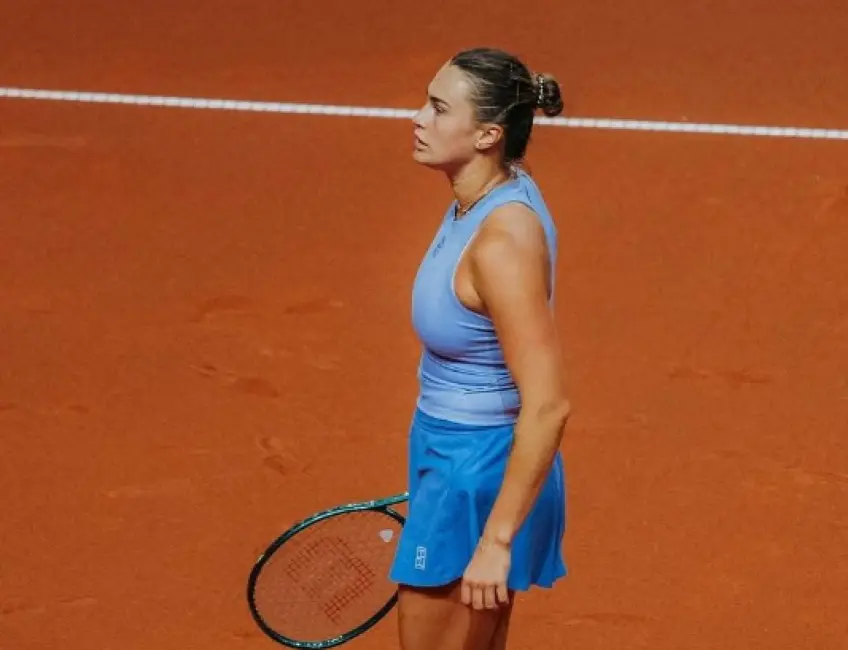
Aryna Sabalenka, the world’s No. 1 women’s tennis player, is no stranger to the spotlight, whether for her thunderous forehands or her bold personality. However, her recent behavior at the Stuttgart Open has drawn sharp criticism from Rennae Stubbs, former coach to tennis legend Serena Williams. After a surprising loss to Jelena Ostapenko in the tournament’s final, Sabalenka’s post-match speech included a sarcastic jab at her coaching team, a move Stubbs called out as repetitive and “passive-aggressive.” The comment, delivered with a smirk during the trophy ceremony, has sparked debate about sportsmanship and professionalism in the high-stakes world of elite tennis.
The Stuttgart Open, also known as the Porsche Tennis Grand Prix, is a prestigious WTA 500 event where Sabalenka has a storied history, having reached the final four times. This year, she entered as the top seed, riding a wave of confidence after a stellar season that included a Miami Open title and a hard-fought Australian Open final appearance. Facing Ostapenko, a former Grand Slam champion known for her aggressive play, Sabalenka battled fiercely but fell short in a gripping match. The defeat stung, and during the runner-up ceremony, Sabalenka’s frustration bubbled over. While thanking her team, she quipped, “Every year, my team hoping to get the car, and we’re going to drive it in Miami,” a sarcastic nod to the tournament’s tradition of awarding a Porsche to the winner. The crowd chuckled, but Stubbs wasn’t laughing.
Stubbs, a respected voice in tennis who coached Williams during her final Major at the 2022 US Open, took issue with Sabalenka’s tone. “You just got to thank your team or not and just stop giving them sh*t because it’s so passive-aggressive and it’s a little annoying,” Stubbs said, emphasizing that Sabalenka’s attempt to play it off with a laugh didn’t soften the jab’s edge. She argued that the remark was part of a troubling pattern, pointing to a similar incident at the Australian Open earlier this year. After losing to Madison Keys in a thrilling final, Sabalenka used her speech to take a dig at her coaches, saying she hoped not to see them for a while. That moment, coupled with her visible frustration—smashing rackets and breaking down in tears—drew mixed reactions, with some praising her raw emotion and others questioning her professionalism.
Sabalenka’s humor is a hallmark of her personality, often endearing her to fans. Her witty, unfiltered speeches and playful banter have made her a standout in post-match ceremonies. Yet, Stubbs and others suggest her sarcasm can cross a line when directed at her team, who work tirelessly to support her success. “It’s not funny,” Stubbs insisted, noting that such comments undermine the respect owed to her coaches, who are paid employees navigating the pressures of her demanding career. The criticism raises questions about where to draw the line between playful candor and inappropriate jabs, especially for a player of Sabalenka’s stature.
This isn’t the first time Sabalenka’s emotions have stirred controversy. Her emotional outburst after the Australian Open loss, where she smashed her racket and covered her face with a towel, divided observers. Some, including Stubbs’ podcast guest Andrea Petkovic, defended her, arguing that her raw passion is what makes her relatable. “You live and die by your sword that you swing,” Petkovic said, suggesting that Sabalenka’s highs and lows are inseparable from her fiery competitiveness. Others, however, see her actions as a sign of immaturity, particularly when they spill into public displays like her Stuttgart speech.
Despite the criticism, Sabalenka’s on-court dominance remains undeniable. Her 2025 season has been a masterclass in resilience, with 23 wins in 27 matches and a Miami Open title where she outclassed top-10 players without dropping a set. Her powerful serve, relentless groundstrokes, and fearless approach have earned praise from coaches like Rick Macci, another of Williams’ former mentors, who called her “more dangerous than any player” due to her biomechanical edge. Yet, as she prepares for the clay season, starting with the Madrid Open, the Stuttgart controversy serves as a reminder of the scrutiny that comes with being No. 1.
Sabalenka’s journey is one of highs and heartbreaks, from her Grand Slam triumphs to her emotional setbacks. Her ability to bounce back, as Macci predicted after her Australian Open loss, suggests she’ll weather this storm. But as the tennis world watches, the question lingers: will Sabalenka temper her sarcasm to avoid alienating her team and fans, or will she lean into her unapologetic style? For now, her “passive-aggressive” remarks have added a new layer to her complex persona, ensuring that her every move—on and off the court—remains must-watch drama.
Leave a Reply